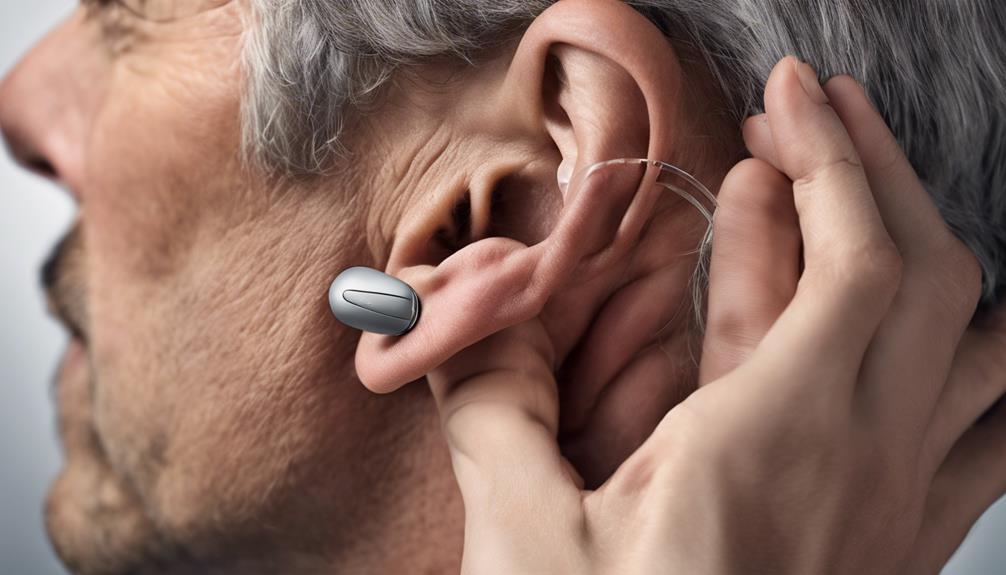When it comes to NHS hearing aids, figuring out the options can feel like solving a difficult puzzle. But don’t worry, we will explain how these devices can significantly improve your quality of life.
From debunking myths to understanding the intricacies of diagnosis, we'll unravel the mystery behind how NHS hearing aids can be a valuable asset.
So, if you've ever wondered about the efficacy of these aids, stay tuned for a comprehensive guide that will provide clarity and insight into the world of hearing solutions.
Key Takeaways
- Free NHS aids offer comprehensive support and upgrading for evolving needs.
- Bluetooth compatibility enhances device connectivity seamlessly.
- Trusted choice for reliable and supportive solutions.
- Financially advantageous with no cost implications compared to private options.
Benefits of NHS Hearing Aids
Why are NHS hearing aids considered a valuable resource for individuals with hearing loss?
NHS hearing aids are provided free of charge, ensuring accessibility to those in need. These digital aids are Bluetooth compatible, allowing users to connect seamlessly to various devices for enhanced communication.
What truly sets NHS hearing aids apart is the comprehensive support and services offered at local centers. From initial assessment to ongoing support, individuals receive personalized care tailored to their medical needs.
When it comes to upgrading NHS aids, the process is thorough, requiring a detailed assessment to determine the necessity based on the user's evolving hearing requirements. The commitment of NHS to prioritize the user's hearing health is evident in the provision of new aids at no cost for approved upgrades.
This dedication to continuous improvement and user satisfaction makes NHS hearing aids a trusted choice for individuals seeking reliable and supportive solutions for their hearing loss.
Comparison of NHS Vs Private Aids

When comparing NHS and private hearing aids, we need to consider:
- The significant cost differences
- The varying levels of service quality
- Ultimately, which option is most suitable for each individual's specific needs.
Cost Differences Explained
Comparing the costs of NHS and private hearing aids reveals distinct differences in the technology and services offered along with their financial implications. NHS hearing aids are provided free of charge, including aftercare and fine-tuning services, which can significantly benefit individuals seeking a structured and beneficial plan.
On the other hand, private hearing healthcare offers more advanced options, such as the latest hearing aid models and styles not typically available through the NHS. While NHS services may include hearing aid batteries for life, these are often additional costs for private options.
Patients considering NHS vs private hearing care should weigh the pros and cons carefully, considering factors like quality of life improvements and personalized attention alongside the financial aspects.
Service Quality Comparison
Regularly consulting with independent audiologists can provide valuable insights into the service quality differences between NHS and private hearing aids. Independent audiologists are known for their high service quality compared to both NHS and private providers.
By exploring the pros and cons of each service, individuals can make informed decisions about their hearing aid care. Understanding the provider ethos and service quality is crucial in determining the best option for personalized treatment.
Comparing service quality between NHS and private providers helps in making confident decisions that lead to effective and tailored solutions. Ultimately, a thorough service comparison ensures that individuals receive the highest quality of care for their hearing needs.
Suitability for You
With varying features and services catered to individual needs, the choice between NHS and private hearing aids hinges on personal preferences, budget constraints, and desired functionalities. When considering suitability, individuals should weigh the following factors:
- Waiting Times: NHS aids may have longer waiting times but offer comprehensive care.
- Customization Options: Private aids provide more advanced technology and customization for a fee.
- Budget and Ongoing Support: NHS aids are free with ongoing support, while private aids offer quicker access but at a cost.
Understanding these differences can help individuals make an informed decision based on their unique requirements and priorities.
Debunking Common Myths

Many people mistakenly believe that hearing aids are uncomfortable. The reality is that modern aids are discreet and comfortable, improving communication for those with hearing loss.
It's crucial to debunk the myth that hearing aids are always cumbersome. Advancements in technology have made them more user-friendly and effective.
Don't let the misconception about discomfort deter you from seeking the valuable assistance that hearing aids, including NHS-provided ones, can offer.
Myth: Hearing Aids Are Uncomfortable
Contrary to popular belief, modern NHS hearing aids are specifically designed for comfort, offering a range of styles tailored to individual preferences and needs. When it comes to debunking the myth that hearing aids are uncomfortable, here are some key points to consider:
- NHS hearing aids come in various styles, including behind-the-ear and in-the-ear options, allowing users to choose what suits them best for comfort.
- Each NHS hearing aid is custom-fit to the wearer's ear shape and size, ensuring a comfortable and secure fit throughout the day.
- NHS audiologists provide valuable guidance on wearing techniques to help users maximize comfort and the effectiveness of their hearing aids.
Fact: Modern Aids Are Discreet
Modern NHS hearing aids, with their discreet designs and varied styles, cater to individual preferences while offering a more aesthetically pleasing option for users. These aids are designed to be smaller and less noticeable, enhancing user satisfaction by providing a subtle solution for hearing loss.
The advances in technology have allowed modern NHS hearing aids to prioritize both functionality and aesthetics, ensuring that users feel comfortable and confident wearing them in various settings. By incorporating sleek and inconspicuous designs, these aids have debunked the myth that all hearing aids are bulky and unattractive.
With a focus on meeting individual preferences, modern NHS hearing aids have revolutionized the perception of hearing assistance, making them a valuable tool for improved quality of life.
Reality: Aids Improve Communication
Improving communication and debunking common myths, NHS hearing aids play a pivotal role in enhancing speech understanding and overall quality of life for individuals with hearing loss.
When it comes to aiding communication, NHS hearing aids excel in several ways:
- Amplifying Sounds: By increasing the volume of sounds, NHS hearing aids make conversations clearer and more audible.
- Enhancing Social Engagement: Users of NHS hearing aids often report better social interactions and reduced feelings of isolation.
- Facilitating Effective Communication: NHS hearing aids enable individuals with hearing loss to communicate effectively in various environments, leading to clearer conversations and improved overall quality of life.
Tips for Optimal Device Use

To make the most of your NHS hearing aids, it is crucial to wear them regularly and follow the recommended cleaning and maintenance instructions provided by your audiologist. By incorporating these habits into your daily routine, you can ensure optimal performance and longevity of your devices. Attending all scheduled follow-up appointments is essential to address any issues, make necessary adjustments, and guarantee that your hearing aids are functioning correctly.
| Tips for Optimal Device Use |
|---|
| 1. Wear Regularly |
| 2. Follow Cleaning Instructions |
| 3. Attend Follow-up Appointments |
In addition to these practices, consider utilizing assistive devices such as hearing aid accessories or apps to enhance your communication and hearing experience in various situations. If you encounter any discomfort, feedback, or changes in your hearing while using NHS hearing aids, seek guidance from your audiologist promptly for resolution and adjustments. Your audiologist is there to support you in making the most out of your hearing aids and improving your overall quality of life.
Effects on Daily Life

After incorporating regular use, proper maintenance, and attending follow-up appointments for your NHS hearing aids, it's important to understand how these devices can positively impact your daily life.
- Enhanced Hearing and Communication: With improved hearing through NHS aids, individuals can experience better communication with loved ones, colleagues, and friends. This leads to increased social interactions and a boost in confidence during conversations.
- Reduced Feelings of Isolation: By enhancing hearing abilities, NHS aids help in reducing feelings of loneliness and isolation. Individuals can actively participate in social gatherings, feel more connected, and engage in various activities without feeling left out.
- Improved Work Performance and Enjoyment of Activities: Better hearing through NHS aids can lead to enhanced work performance, productivity, and overall job satisfaction. Additionally, individuals can enjoy activities such as watching TV, talking on the phone, and engaging in conversations with ease, contributing to an overall improvement in quality of life.
Understanding Hearing Loss Variances

How do different types of hearing loss impact individuals and what specific treatment approaches are required for each? Hearing loss can manifest in various forms, such as conductive, sensorineural, or mixed, each necessitating tailored treatment strategies. Factors like aging, noise exposure, genetics, and medical conditions can contribute to the severity and type of hearing loss experienced by individuals. Audiograms play a crucial role in assessing the extent of hearing loss and guiding the development of personalized treatment plans. Understanding the underlying causes of hearing impairment is essential for determining the most effective intervention strategies to improve hearing outcomes. The impact of hearing loss extends beyond just auditory difficulties, affecting communication abilities, social interactions, and overall quality of life. Therefore, timely diagnosis and appropriate interventions are vital in addressing hearing loss and enhancing the well-being of individuals.
| Hearing Loss Type | Treatment Approaches | Underlying Causes |
|---|---|---|
| Conductive | Medical/Surgical Management | Infections, Ear Trauma |
| Sensorineural | Hearing Aids/Cochlear Implants | Aging, Noise Exposure |
| Mixed | Combination of Treatments | Genetics, Medical Conditions |
This table provides insights into the diverse treatment approaches and underlying causes associated with different types of hearing loss, emphasizing the need for personalized care to address individual needs effectively.
Importance of Diagnosis

Understanding the importance of early diagnosis in addressing hearing loss is crucial for preserving auditory function and optimizing treatment outcomes. When it comes to diagnosing hearing loss, seeking assistance from a local GP or an ENT specialist is essential. These professionals can conduct thorough assessments to determine the extent and type of hearing loss. Here's why diagnosis plays a pivotal role:
- Prompt Testing: It's recommended to undergo testing promptly if any changes in hearing are noticed. Early detection can help address issues before they worsen.
- Tailored Treatment: Through specialist assessments provided by the NHS, individuals can receive personalized treatment plans based on their unique diagnosis. This tailored approach ensures that individual preferences and specific hearing needs are taken into account.
- Improving Treatment Outcomes: Early diagnosis not only prevents further deterioration but also significantly improves treatment outcomes. By identifying hearing loss early on, individuals can embark on a journey towards better hearing health and overall well-being.
Making Confident Decisions

Upon receiving a comprehensive diagnosis for hearing loss, individuals are empowered to make confident decisions regarding their hearing healthcare options. It's crucial to take the time to explore all available services, including both NHS and private hearing healthcare providers.
Getting a second opinion can provide valuable insights into the full range of treatments and technologies available. When considering private hearing aids, it's essential to weigh the pros and cons, as newer ranges may offer advanced features but at a higher cost.
Hearing aid experts can guide individuals in choosing the most suitable hearing solution based on their specific needs and preferences. By understanding the benefits of each provider and the right treatment for their condition, individuals can make informed choices that align with their healthcare goals.
Confidence in decision-making comes from thorough research and a deep understanding of the options available, ensuring that individuals receive the best possible care for their hearing loss.
Frequently Asked Questions
Are the NHS Hearing Aids Any Good?
They're indeed good! NHS hearing aids offer modern technology, digital features, and Bluetooth compatibility at no cost. With free batteries, repairs, and follow-up appointments for life, they provide ongoing support.
Lost aids are replaced without charge, and local centers offer essential care. Upgrading is tailored to individual needs, ensuring proper assistance.
What Choice Is There for NHS Hearing Aids?
When it comes to NHS hearing aids, the range available may seem limited compared to private options, but the quality and care that accompany them are priceless.
The NHS provides users with a selection of digital aids. Users can benefit from free follow-up appointments, lifetime repairs, and coverage for lost aid replacements.
This level of support ensures that users receive reliable and accessible care for their hearing needs.
What Brand Are NHS Hearing Aids?
We source NHS hearing aids from trusted manufacturers like Phonak, Oticon, Widex, and GN ReSound. These brands meet NHS specifications for reliability, performance, and user satisfaction. Their durable and effective models cater to various types of hearing loss.
Users can rely on the quality and technology of these hearing aids because they come from reputable brands. The selection process ensures that NHS hearing aids are top-notch and meet the needs of diverse users.
Do NHS Hearing Aids Have a Loop Setting?
Yes, NHS hearing aids lack a loop setting, which restricts their compatibility with hearing loop systems. This limitation may pose challenges in venues equipped with hearing loops.
Private hearing aids, on the other hand, often offer a telecoil feature for easy connection to these systems. Thus, individuals who frequently visit places with hearing loops might find private hearing aids with telecoil technology more advantageous for improved accessibility.
Can the Quality of Hearing Aid Batteries Impact the Effectiveness of NHS Hearing Aids?
The quality of hearing aid batteries can significantly impact the effectiveness of NHS hearing aids. Using the best hearing aid batteries ensures a longer lifespan, reliable performance, and consistent power supply for optimal hearing assistance. It is important to invest in high-quality batteries for the best hearing aid experience.
Conclusion
In conclusion, NHS hearing aids can be a great option for those seeking affordable and quality hearing assistance. Did you know that approximately 11 million people in the UK have some form of hearing loss?
By exploring the benefits, debunking myths, and understanding the importance of diagnosis, individuals can make informed decisions about their hearing health. Remember, the right hearing aid can greatly improve your quality of life and overall well-being.










